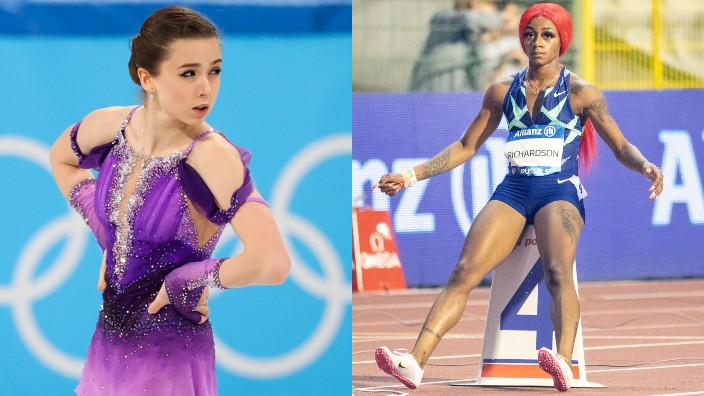Sha’Carri Richardson’s reaction to the ruling on the Russian skater is understandable, but there is a difference
OPINION: While their cases aren't exactly the same, no one can blame the U.S. sprinter for being upset about Kamila Valieva being allowed to continue her Olympic dreams after failing a drug test. After all, Black people are disproportionally punished for using weed.

The 15-year-old Russian figure skater can compete in the Olympics after failing a drug test, and the 21-year-old American sprinter is pissed off. Understandably so.
Sha’Carri Richardson isn’t here for officials’ explanations, justifications and rationalizations. The bottom line is that Kamila Valieva can pursue her dreams at the Beijing Olympics despite testing positive for a banned substance (one considered a performance enhancer), while Richardson’s dreams for last year’s Tokyo Olympics were canceled when she tested positive for marijuana (which isn’t a performance enhancer).
Their respective eligibility status led Richardson to compare the two cases and reach a familiar conclusion. “The only difference I see is I’m a black young lady,” she tweeted in response to the Court of Arbitration for Sport ruling in Valieva’s favor.
Other distinctions exist but it’s hard to blame Richardson for feeling that way. After all, Blacks ARE disproportionately punished for weed.
According to an ACLU study, Blacks are 3.64 times more likely than whites to be arrested for possession, even though usage rates are virtually identical across races. That’s true in states that have ended the prohibition of marijuana and worse in states that haven’t. Some still-criminalized states are arresting Blacks for cannabis at almost 10 times the rate for whites.
Almost no one except Russians and the CAS panel of arbiters believes Valieva should be allowed to continue. The World Anti-Doping Agency said it is “disappointed” by the decision to overturn Valieva’s suspension. The United States Olympic and Paralympic Committee expressed similar sentiments. “This appears to be another chapter in the systematic and pervasive disregard for clean sport by Russia,” CEO Sarah Hirshland said in a statement.
Valieva tested positive for trimetazidine, a banned heart medication that could increase endurance. It might come in handy during training for, say, quadruple jumps; last week, Valieva became the first woman to complete a quad in an Olympic competition. CAS ruled that Valieva, as a minor, is a “protected person” and subject to more protection under WADA’s own code.
WADA strongly disagreed with the interpretation that using banned substances is fine if you’re underage. The International Olympic Committee said there’ll be no medal ceremonies for events that put Valieva on the podium, and she still might be stripped of medals at a later date.
The ruling is especially confounding based on Russia’s history as a blatant cheater. Valieva and her compatriots are caping for the “Russian Olympic Committee” because their country is too crooked to officially participate. Technically, Russia is banned from these Games and other international competitions due to its massive doping scandal at the 2014 Winter Olympics.
Richardson won the 100 meters in the U.S. Olympic trials last summer and was a gold medal favorite, but her result was erased when she tested positive for marijuana. The U.S. Anti-Doping Agency issued a one-month suspension, and that suspension wiped out one of the Games’ most highly anticipated events, a potential race pitting Richardson against Jamaica’s top sprinters (who ultimately swept gold, silver, and bronze in Tokyo).
Richardson admitted to firing up as she coped with her mother’s death a few days earlier. “I was definitely triggered and blinded by emotions, blinded by sadness, and hurting and trying to hide hurt,” Richardson said on NBC’s Today. “I know I can’t hide myself, so in some type of way, I was trying to hide my pain.”

Richardson accepted responsibility for her decision and didn’t appeal the suspension, even as others questioned the merits of marijuana remaining on WADA’s list of banned substances.
The organization considers weed a drug of abuse and not a performance enhancer. USA Track and Field said it was “incredibly sympathetic to the extenuating circumstances,” but opted to leave Richardson off the 4×100 relay team that was scheduled to compete after her suspension ended. However, USATF joined a chorus of voices, saying it “fully agrees” that international rules regarding cannabis use should be re-evaluated.
Three months later, WADA concurred.
Roger Pielke Jr., a University of Colorado professor who studies sports governance, said a change is overdue. “Whatever one thinks about recreational drugs, what’s WADA’s business in regulating them, given that we have jurisdictions around the world that have legal frameworks to do exactly that?” he told USA Today. “A lot of attention that could be paid to regulating actual doping drugs gets spent on regulating these morality drugs.”
So, even if the Valieva case isn’t apples-to-apples, and the relevant organizations aren’t the same, and Richardson isn’t 100 percent correct in tweeting, “It’s all in the skin,” she has reason to suspect melanin plays a role.
Unless you want her to buy all the explanations, justifications and rationalizations for racial disparities in arrests for weed.

An award-winning columnist and a principal of BlackDoor Ventures, Inc., Deron Snyder is a veteran journalist, stratcomm professional, author, and adjunct professor. A native of Brooklyn and an Alpha from H.U.-You Know, he resides in metropolitan DC with his wife, Vanessa, mother of their daughters, Sierra and Sequoia. To learn more, please visit blackdoorventures.com/deron.
TheGrio is now on your TV via Apple TV, Amazon Fire, Roku, and Android TV. Please download theGrio mobile apps today!


